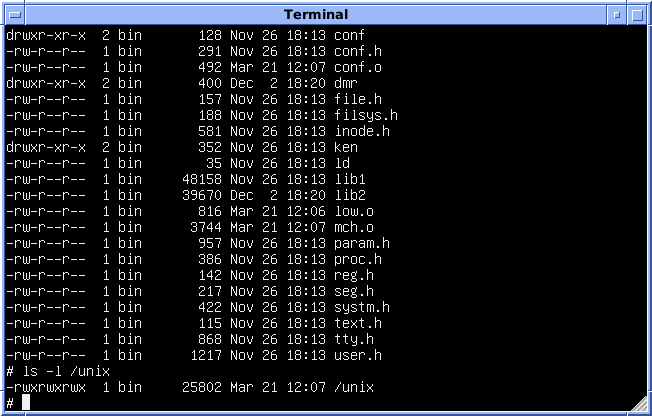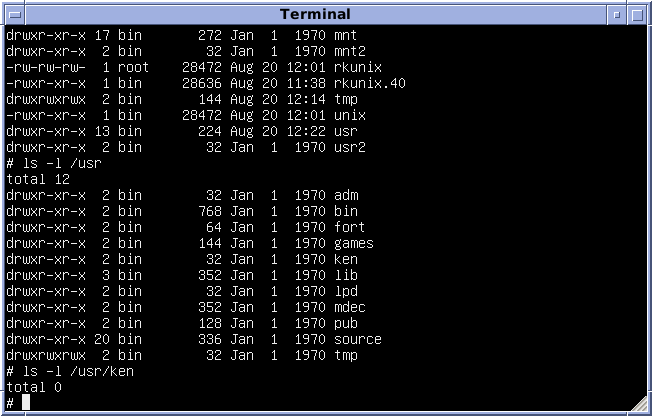Research Unix on:
[Wikipedia]
[Google]
[Amazon]
Research Unix refers to the early versions of the



/ref> First edition Unix was restored to a usable state by a restoration team from the Unix Heritage Society in 2008. The restoration process started with paper listings of the source code which were in PDP-11 assembly language.
UNIX EvolutionPostScript
by Ian F. Darwin and Geoffrey Collyer
Unix heritage
- More links and source code for some Research Unix versions
by Dennis M. Ritchie
The Restoration of Early UNIX Artifacts
by Warren Toomey, School of IT, Bond University
Full Manual Pages documentation for Research Unix 8th Edition
List of new features in Research Unix 9th Edition
Emulator for running UNIX v9
* Pamela Jones (August 23, 2003
Ancient UNIX Released Under What Terms?
Groklaw
The Unix Heritage Society (TUHS)
for the preservation and maintenance of historical UNIX systems
code, disk images, and related
at TUHS
Unix First Edition Manual PagesRestoration of 1st Edition UNIX kernel sources from Bell Laboratories
{{unix-like Bell Labs Unices Computing platforms Discontinued operating systems Unix variants
Unix
Unix (, ; trademarked as UNIX) is a family of multitasking, multi-user computer operating systems that derive from the original AT&T Unix, whose development started in 1969 at the Bell Labs research center by Ken Thompson, Dennis Ritchie, a ...
operating system for DEC PDP-7, PDP-11, VAX and Interdata 7/32 and 8/32 computers, developed in the Bell Labs
Nokia Bell Labs, commonly referred to as ''Bell Labs'', is an American industrial research and development company owned by Finnish technology company Nokia. With headquarters located in Murray Hill, New Jersey, Murray Hill, New Jersey, the compa ...
Computing Sciences Research Center (CSRC). The term ''Research Unix'' first appeared in the Bell System Technical Journal (Vol. 57, No. 6, Part 2 July/August 1978) to distinguish it from other versions internal to Bell Labs (such as PWB/UNIX and MERT) whose code-base had diverged from the primary CSRC version. However, that term was little-used until Version 8 Unix (1985), but has been retroactively applied to earlier versions as well. Prior to V8, the operating system was most commonly called simply UNIX (in caps) or the UNIX Time-Sharing System.
Ancient UNIX is any early release of the Unix
Unix (, ; trademarked as UNIX) is a family of multitasking, multi-user computer operating systems that derive from the original AT&T Unix, whose development started in 1969 at the Bell Labs research center by Ken Thompson, Dennis Ritchie, a ...
code base prior to Unix System III, particularly the Research Unix releases prior to and including Version 7 (the base for UNIX/32V as well as later developments of AT&T Unix).
History



AT&T
AT&T Inc., an abbreviation for its predecessor's former name, the American Telephone and Telegraph Company, is an American multinational telecommunications holding company headquartered at Whitacre Tower in Downtown Dallas, Texas. It is the w ...
licensed Version 5 to educational institutions, and Version 6 also to commercial sites. Schools paid $200 and others $20,000, discouraging most commercial use, but Version 6 was the most widely used version into the 1980s. Research Unix versions are often referred to by the edition of the manual that describes them, because early versions and the last few were never officially released outside of Bell Labs, and grew organically. So, the first Research Unix would be the First Edition, and the last the Tenth Edition. Another common way of referring to them is as "Version ''x'' Unix" or "V''x'' Unix", where ''x'' is the manual edition. All modern editions of Unix—excepting Unix-like
A Unix-like (sometimes referred to as UN*X, *nix or *NIX) operating system is one that behaves in a manner similar to a Unix system, although not necessarily conforming to or being certified to any version of the Single UNIX Specification. A Uni ...
implementations such as Coherent, Minix, and Linux
Linux ( ) is a family of open source Unix-like operating systems based on the Linux kernel, an kernel (operating system), operating system kernel first released on September 17, 1991, by Linus Torvalds. Linux is typically package manager, pac ...
—derive from the 7th Edition.
Starting with the 8th Edition, versions of Research Unix had a close relationship to BSD
The Berkeley Software Distribution (BSD), also known as Berkeley Unix or BSD Unix, is a discontinued Unix operating system developed and distributed by the Computer Systems Research Group (CSRG) at the University of California, Berkeley, beginni ...
. This began by using 4.1cBSD as the basis for the 8th Edition. In a Usenet
Usenet (), a portmanteau of User's Network, is a worldwide distributed discussion system available on computers. It was developed from the general-purpose UUCP, Unix-to-Unix Copy (UUCP) dial-up network architecture. Tom Truscott and Jim Elli ...
post from 2000, Dennis Ritchie described these later versions of Research Unix as being closer to BSD than they were to UNIX System V, which also included some BSD code:
Versions
Licensing
After the publication of the Lions' book, work was undertaken to release earlier versions of thecodebase
In software development, a codebase (or code base) is a collection of source code used to build a particular software system, application, or software component. Typically, a codebase includes only human-written source code system files; thu ...
. SCO first released the code under a limited educational license.
Later, in January 2002, Caldera International
Caldera International, Inc., earlier Caldera Systems, was an American software company that existed from 1998 to 2002 and developed and sold Linux- and Unix-based operating system products.
Caldera Systems was created in August 1998 as a spinoff ...
(later to become SCO Group
The SCO Group (often referred to SCO and later called The TSG Group) was an American software company in existence from 2002 to 2012 that became known for owning Unix operating system assets that had belonged to the Santa Cruz Operation (the or ...
and made defunct) relicensed (but has not made available) several versions under the four-clause BSD license
BSD licenses are a family of permissive free software licenses, imposing minimal restrictions on the use and distribution of covered software. This is in contrast to copyleft licenses, which have share-alike requirements. The original BSD lic ...
, up to an including Version 7 Unix
Version 7 Unix, also called Seventh Edition Unix, Version 7 or just V7, was an important early release of the Unix operating system. V7, released in 1979, was the last Bell Laboratories release to see widespread distribution before the commerc ...
( UNIX/32V). , there has been no widespread use of the code, but it can be used on emulator systems, and ''Version 5 Unix'' runs on the Nintendo
is a Japanese Multinational corporation, multinational video game company headquartered in Kyoto. It develops, publishes, and releases both video games and video game consoles.
The history of Nintendo began when craftsman Fusajiro Yamauchi ...
Game Boy Advance
The (GBA) is a 32-bit handheld game console, manufactured by Nintendo, which was released in Japan on March 21, 2001, and to international markets that June. It was later released in mainland China in 2004, under the name iQue Game Boy Advanc ...
using the SIMH PDP-11 emulator
In computing, an emulator is Computer hardware, hardware or software that enables one computer system (called the ''host'') to behave like another computer system (called the ''guest''). An emulator typically enables the host system to run sof ...
. ''Version 6 Unix'' provides the basis for the MIT xv6 teaching system, which is an update of that version to ANSI C and the x86 or RISC-V platform.
The BSD
The Berkeley Software Distribution (BSD), also known as Berkeley Unix or BSD Unix, is a discontinued Unix operating system developed and distributed by the Computer Systems Research Group (CSRG) at the University of California, Berkeley, beginni ...
vi text editor
A text editor is a type of computer program that edits plain text. An example of such program is "notepad" software (e.g. Windows Notepad). Text editors are provided with operating systems and software development packages, and can be used to c ...
is based on code from the ed line editor in those early Unixes. Therefore, "traditional" vi could not be distributed freely, and various work-alikes (such as nvi) were created. Now that the original code is no longer encumbered, the "traditional" vi has been adapted for modern Unix-like
A Unix-like (sometimes referred to as UN*X, *nix or *NIX) operating system is one that behaves in a manner similar to a Unix system, although not necessarily conforming to or being certified to any version of the Single UNIX Specification. A Uni ...
operating systems.
SCO Group, Inc. was previously called Caldera International. As a result of the '' SCO Group, Inc. v. Novell, Inc.'' case, Novell, Inc. was found to not have transferred the copyrights of UNIX to SCO Group, Inc. Concerns have been raised regarding the validity of the Caldera license.
The Unix Heritage Society
''The Unix Heritage Society'' was founded by Warren Toomey.MP3 44:34/ref> First edition Unix was restored to a usable state by a restoration team from the Unix Heritage Society in 2008. The restoration process started with paper listings of the source code which were in PDP-11 assembly language.
Legacy
In 2002,Caldera International
Caldera International, Inc., earlier Caldera Systems, was an American software company that existed from 1998 to 2002 and developed and sold Linux- and Unix-based operating system products.
Caldera Systems was created in August 1998 as a spinoff ...
released Unix V1, V2, V3, V4, V5, V6, V7 on PDP-11 and Unix 32V on VAX as FOSS under a permissive BSD-like software license
A software license is a legal instrument governing the use or redistribution of software.
Since the 1970s, software copyright has been recognized in the United States. Despite the copyright being recognized, most companies prefer to sell lic ...
.
In 2017, The Unix Heritage Society and Alcatel-Lucent
Alcatel-Lucent S.A. () was a multinational telecommunications equipment company, headquartered in Boulogne-Billancourt, Paris, France. The company focused on Fixed line telephone, fixed, Mobile phone, mobile and telecommunications convergence, ...
USA Inc., on behalf of itself and Nokia
Nokia Corporation is a Finnish multinational corporation, multinational telecommunications industry, telecommunications, technology company, information technology, and consumer electronics corporation, originally established as a pulp mill in 1 ...
Bell Laboratories, released V8, V9, and V10 under the condition that only non-commercial use was allowed, and that they would not assert copyright claims against such use.
See also
* Ancient UNIX * History of Unix * Lions' Commentary on UNIX 6th Edition, with Source Code * PWB/UNIX - A version of Unix for internal use at Bell Labs for production useReferences
External links
UNIX Evolution
by Ian F. Darwin and Geoffrey Collyer
Unix heritage
- More links and source code for some Research Unix versions
by Dennis M. Ritchie
The Restoration of Early UNIX Artifacts
by Warren Toomey, School of IT, Bond University
Full Manual Pages documentation for Research Unix 8th Edition
List of new features in Research Unix 9th Edition
Emulator for running UNIX v9
* Pamela Jones (August 23, 2003
Ancient UNIX Released Under What Terms?
Groklaw
The Unix Heritage Society (TUHS)
for the preservation and maintenance of historical UNIX systems
code, disk images, and related
at TUHS
Unix First Edition Manual Pages
{{unix-like Bell Labs Unices Computing platforms Discontinued operating systems Unix variants